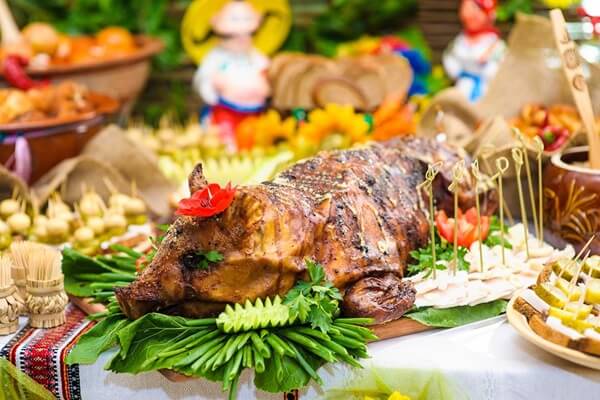National Roast Suckling Pig Day is celebrated on December 18 with a delicious feast. Suckling pigs are a special treat because their meat is more tender, juicier, and has a gelatin-like texture due to higher collagen levels. This is because they are only two to six weeks old and still nursing from their mother, which is why they’re called “suckling.” If you can bring yourself to roast a whole baby pig, from head to tail, it makes a delicious meal that can feed 20 adults — so gather your family and start roasting (ideally 5 hours before you plan to eat).
History of National Roast Suckling Pig Day
The history of National Roast Suckling Pig Day is unclear, with no one certain about its origins or the reason behind its creation. However, it’s not surprising that this delicacy has its own day.
Many of us have likely seen images in children’s books or cartoons of a pig on a large platter, complete with an apple in its mouth, surrounded by medieval celebrations. Pigs have a long history with humans, as they were among the first animals to be domesticated.
Suckling pigs have long been the highlight of feasts and banquets in various cuisines and are a traditional dish in countries like China, Spain, the U.S., and the Philippines.
Some of the earliest mentions of suckling pigs can be found in ancient texts, including the Salian Law from the sixth century. It states: “If someone has stolen a suckling pig and this is proven against him, the guilty party will be sentenced to 120 denarii which adds up to three solidi [Latin coins].” This shows that people greatly valued their piglets even back then.

Spain is widely recognized as the birthplace of the tradition of roasting suckling pigs, known there as cochinillo asado. The most famous region for this dish is Castile, particularly the city of Segovia.
The tradition is believed to have been introduced to Spain by the Romans during their invasion of Hispania in 218 B.C.
The dish gained even more popularity in the 1930s when a tavern owner in Segovia began cutting the roasted suckling pig with the edge of a plate to showcase the tenderness of the meat and add a bit of flair to the presentation. This showy technique became a trend that many Spanish restaurants still practice today.
This delicacy is so important in Spain that it has been referenced by several literary greats. In Miguel de Cervantes’ novel Don Quixote, the characters Don Quixote and his squire Sancho Panza encounter a wedding in the Castilian countryside, where they see several suckling pigs roasting over a fire.
Ernest Hemingway was also a fan of this dish and mentioned his favorite Spanish restaurant, famous for its roast suckling pig, in The Sun Also Rises.
Timeline of National Roast Suckling Pig Day
| 218 B.C. (Roman Invasion of Hispania) | The Roman Empire invades Hispania, bringing with it the roast suckling pig tradition and kick-starting the dish’s popularity among the Spanish. |
| 6th century (Earliest Records of Suckling Pig) | The earliest mention of the suckling pig appears in records dating from the sixth century, such as the Salian Law. |
| 1725 (Earliest Established Roast Suckling Pig Restaurant) | Casa Botin in Madrid opens, which is known as the oldest restaurant in Madrid and reportedly makes the best cochinillo asado. |
| 1930s (Cutting Edge) | Don Candido, a Segovian tavern-owner, begins entertaining his guests by cutting roast suckling pig with the edge of a plate to demonstrate its tenderness. |
5 Mind-Blowing Facts About National Roast Suckling Pig Day
- The Oldest Restaurant in the World Serves It: Casa Botin, recognized by Guinness World Records as the oldest restaurant in the world, is famous for serving the best cochinillo asado.
- It Won’t Increase Your Cholesterol: Suckling pig meat contains 40% less fat than that of an adult pig, making it a healthier option that won’t raise your cholesterol levels.
- It’s a Sign of Prosperity: In China, a whole roast pig symbolizes wealth and prosperity, often served at weddings and special events to mark these occasions.
- Hemingway Was an Enthusiastic Fan: Famed American novelist Ernest Hemingway was a regular at Casa Botin, where he often indulged in roast suckling pig at a table near the kitchen.
- The Plate-Cutting Tradition Has Become More Spectacular: In some traditional Spanish restaurants, chefs now add flair to the plate-cutting tradition by smashing the plate on the floor after slicing through the roast suckling pig.
Conclusion
National Roast Suckling Pig Day is a celebration of culinary history, tradition, and indulgence. From ancient times to modern-day festivities, the suckling pig has been a symbol of communal feasts and cultural significance.
Whether you are drawn by the tender, succulent meat or the rich history behind it, this day offers an opportunity to gather loved ones and partake in a dish that has delighted palates for centuries. As you enjoy this age-old delicacy, you’re not just savoring a meal but also honoring a tradition that has stood the test of time.
Frequently Ask Question
Why is the suckling pig considered a delicacy?
Suckling pigs are considered a delicacy because of their tender, juicy meat, which has a unique texture due to the piglet’s young age. The higher collagen content in their meat adds to its tenderness and richness.
What is the origin of National Roast Suckling Pig Day?
The exact origins of National Roast Suckling Pig Day are unclear, but the tradition of roasting suckling pigs has a long history, particularly in Spain, where it is known as cochinillo asado.
How did the tradition of roasting suckling pigs begin?
The tradition of roasting suckling pigs is believed to have been introduced to Spain by the Romans during their invasion of Hispania in 218 B.C. Over time, it became a popular dish in Spain and other countries.
What are some historical references to suckling pigs?
Suckling pigs have been mentioned in various historical texts, including the Salian Law from the sixth century, which imposed a fine for stealing a suckling pig. Literary references include mentions in Miguel de Cervantes’ Don Quixote and Ernest Hemingway’s The Sun Also Rises.
Why is roasting a suckling pig significant in Spain?
In Spain, roasting a suckling pig is a cherished tradition, especially in the region of Castile. The dish gained popularity in the 1930s when a tavern owner in Segovia began cutting the roasted pig with the edge of a plate to demonstrate its tenderness.
How long does it take to roast a suckling pig?
Roasting a whole suckling pig typically takes about five hours, so it’s best to start the preparation well before your planned mealtime.
You may also like to read, National Ambrosia Day – December 12, 2024
